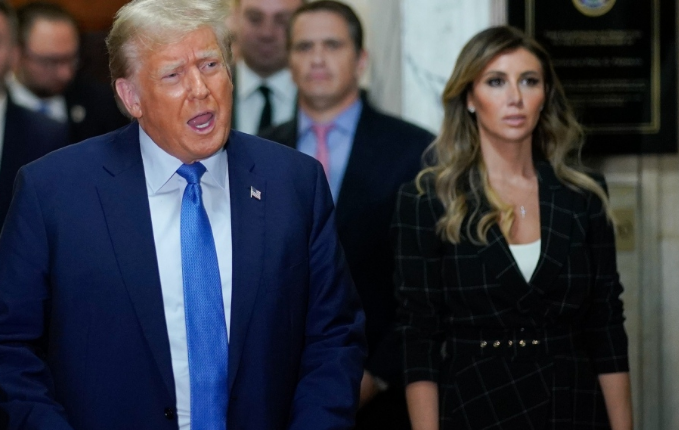In an unprecedented turn of events, Donald J. Trump, the former President of the United States, became the first to testify as a defendant in his own trial. The courtroom was charged with anticipation as the jury was brought in to hear the testimony of a figure who has dominated American politics like few others. The transcripts of this historic moment, now public, provide a detailed account of the proceedings that unfolded under the watchful eye of the judiciary.
A Legal Drama Unfolds
As the proceedings began, the atmosphere in the courtroom was palpable. The judge’s call to Ms. Alina Habba, Trump’s attorney, to examine the witness set the stage for a momentous occasion. “The defense calls President Donald Trump,” announced Habba, marking the start of a testimony that would be etched in the annals of legal history. The deputy clerk’s routine request for the witness to state his name for the record seemed almost surreal given the witness’s identity: “Donald John Trump.”
The questioning started with Trump’s reflection on his deposition, which had been scrutinized at length during the trial by the plaintiffs’ counsel. Trump affirmed his adherence to his deposition testimony, stating, “100%. Yes.” This assertion set the tone for his stance against the allegations made by E. Jean Carroll, which he vehemently denied, labeling them as “false accusations.”
Roberta Kaplan, Carroll’s attorney, was quick to challenge Trump’s responses, leading to several objections and instructions from the judge for the jury to disregard certain statements. The legal exchanges were tense, with Kaplan’s cross-examination probing into the details of previous legal encounters between Trump and Carroll, only to be met with objections from Habba that were sustained by the judge.
The questioning ventured into the territory of past trials and legal advice, with Trump confirming his participation and counsel in previous legal matters. Kaplan’s attempts to delve deeper were stymied by sustained objections, maintaining a tight focus on the immediate facts of the case.
As the examination concluded, the brevity of Trump’s testimony—lasting merely three minutes—stood in stark contrast to the magnitude of the occasion. The judge’s final words excusing Trump from the stand marked the end of a historic testimony, leaving the courtroom and the nation to ponder the implications of a former President taking the stand in his own defense.
This landmark moment in the courtroom is not just a chapter in Trump’s legal saga but a testament to the complexities of accountability and the legal system’s role in addressing allegations against figures of immense public influence. The trial, with its high stakes and intense scrutiny, underscores the enduring principles of justice and the rule of law in the face of unprecedented scenarios.
Read More:
- A Call for Change: Maine’s Push for Enhanced Gun Safety Legislation
- I Saw My Friends Disappear’: Massive Waves Pummel US Military Base On Marshall Islands
- Passaic County Sheriff Richard Berdnik dies by suicide in restaurant bathroom
As the legal proceedings continue to unfold, the impact of Trump’s testimony on the trial’s outcome and its broader implications for American jurisprudence and presidential accountability remain to be seen. This episode, rich in legal and political significance, will undoubtedly be analyzed and debated by legal scholars, historians, and the public for years to come, marking a defining moment in the intersection of law, politics, and the presidency.

